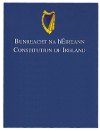Religious freedom claims should not extend to publicly funded hospitals and are probably not protected by the  Constitution, a legal academic has claimed.
Constitution, a legal academic has claimed.
Writing in The Irish Times, Dr Eoin Daly, a law lecturer in UCD, said the claim that the Constitution protects the religious freedoms of institutions as well as individuals is based on “an over-broad interpretation of the relevant constitutional principles”.
He was responding to claims that some legal experts that Catholic hospitals such as the Mater in Dublin may be protected by the Constitution from having to carry out abortions under the terms of the new abortion law and against their ethos.
In his article, Dr Daly said that the Constitution “protects religious freedom for individuals and states that a religious denomination will ‘have the right to manage its own affairs . . . and maintain institutions for religious or charitable purposes’”.
He added: “Sometimes denominational autonomy is interpreted as meaning that legislation cannot impose requirements inconsistent with the ethos of denominationally owned institutions.
“For example, it has been assumed that the Constitution requires denominational schools to be exempted from certain aspects of employment equality legislation, despite the public function such schools fulfil.”
He said that, by this standard, religious freedom meant that legislation “cannot undermine the ethos of denominational institutions, whether medical or educational”
He argued that this constitutional rationale is weak in relation to schools and “even weaker in relation to voluntary hospitals”.
He said: “First, it has never been recognised that religious freedom entitles individuals or institutions to exemptions from legislative obligations simply because such obligations are inconsistent with religious beliefs – at least where such requirements have no bearing on religious practice.
“While the Supreme Court has not adopted a conclusive stance concerning religious exemptions from legislation, the European Court of Human Rights in Strasbourg, for example, has consistently affirmed that religious freedom will not necessarily entitle individuals to exercise beliefs in professional or public service contexts.”
He also argued that the freedom guaranteed to religious denominations under the Constitution gave them “an extensive sphere of noninterference for the internal functioning of religious denominations”, but that this protection was “more qualified……for activities denominational-ethos institutions might undertake in the wider public world”.
Dr Daly said: “While legislation cannot interfere in the inner sanctum of religious function, there can surely be no claim that legislation regulating various activities outside the religious context must accommodate doctrinal religious requirements.
“It is even questionable whether denominational autonomy could be invoked by a voluntary hospital. Only ‘religious denominations’ as such are stated to have the right to ‘manage their own affairs’; this is arguably distinct from medical or educational institutions operating under a denominational ethos.
“Denominations have the right to ‘maintain’ such institutions, but nothing suggests they are to be immune from legislative requirements safeguarding public interests.
“Thus the further a particular denominational body posits itself in the wider public world, the more it becomes subject to increasing levels of public regulation.
“Denominational schools, for example, are subject to extensive state regulation, given the public function they fulfil.
“Similarly, voluntary hospitals access considerable public funding and provide a public service to the wider community irrespective of religion.”
He continued: “’Religious freedom’ discourse now often has little to do with the right to undisturbed religious practice. Instead it is used to defend the traditional prerogatives of institutional Catholicism to shape and define the public sphere.
“Historically such claims were articulated in more bellicose language. But this defensive invocation of religious freedom must be seen as part of a subtle rhetorical shift since the 1990s, echoed, for example, in the discourse surrounding denominational schools – in the ostensibly liberal terminologies of ‘diversity’ and ‘choice’.”















